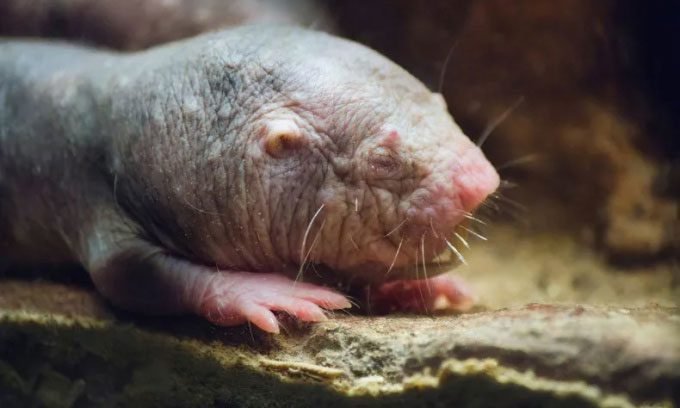A team of experts at the University of Rochester has introduced a special gene from the naked mole rat into mice, enhancing their health and increasing their lifespan by 4.4%.
In a groundbreaking study, the team at the University of Rochester in New York demonstrated how to transfer longevity genes from the longest-living rodent species – naked mole rat (Heterocephalus glaber) – into mice to extend their lifespan and improve their overall health. The findings were published in the journal Nature on August 23.

The naked mole rat is known for its resistance to age-related diseases and its unusually long lifespan. (Photo: Tennessee Witney).
“Our research provides evidence that the unique mechanisms of longevity evolved by long-lived mammals can be ‘exported’ to enhance the lifespan of other mammalian species,” said Vera Gorbunova, a professor of biology at the University of Rochester and a co-author of the study.
The naked mole rat is renowned for its resistance to age-related diseases and has an extraordinary lifespan that is nearly ten times that of similarly sized rodents. The research team from the University of Rochester was particularly interested in this unusual ability, and in 2020, they discovered a gene involved in at least one of the mechanisms leading to their longevity. This gene is responsible for producing high molecular weight hyaluronic acid (HMW-HA), a molecule shown to enhance cellular resilience to stress and inflammation.
The bodies of naked mole rats contain approximately ten times more of this stress-resistant molecule compared to humans or mice. This is due to the gene that produces this molecule – hyaluronan synthase 2 – being expressed much more strongly in naked mole rats than in other animals.
Gorbunova and her colleagues found that this highly expressed version of the hyaluronan synthase 2 gene could be transferred from naked mole rats to mice, carrying with it the characteristics that enhance longevity. In the new study, mice with the naked mole rat version of the gene were better able to resist skin cancer, showed improved overall health, and lived 4.4% longer than their peers.
The research team is still unclear why HMW-HA has such a positive effect on health and longevity, but they believe it relates to the molecule’s ability to directly modulate the immune system. So far, the effects of the hyaluronan synthase 2 gene have only been observed in mice. However, this new discovery opens up exciting possibilities in anti-aging research and efforts to extend human lifespan.
“We hope the findings from our team will provide the first example, and not the last, of how the longevity traits of a long-lived species can be harnessed to benefit human health and lifespan,” co-author Andrei Seluanov shared.




















































